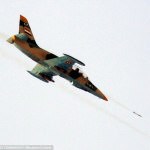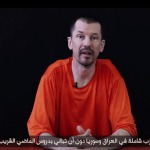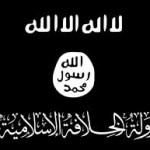Dragons Egg weapons cache may have been opened
Soldiers are concerned that the contents of the most secret bunker of Saddam Hussein’s regime, known as the Dragon’s Egg, may have been unsealed after reports that ISIS may be using chemical weapons. The X-shaped bunker was sealed with cement and was treated differently from other storage spaces at the Al Muthanna facility, says Lt. Joshua Hartley, who was stationed there in 2008 with the weapons company of the U.S. Marine Corps Second Division’s First Battalion.
We were made aware of a particular bunker on the north side [of Al Muthanna] which we were informed was sealed and remotely monitored. We were not to approach, and definitely not to attempt to enter.
He says it is an open secret that the bunker contained large amounts of the regime’s most dangerous nerve agents. Gen. Jack Kean, chairman of the Institute for the Study of War, says the Dragons Egg and other caches could be used against troops:
Frankly, the weapons could be used by ISIS. Our troops’ mission was not to clean this up; that was something the Iraqis were supposed to do, and obviously they didn’t do a very good job of it. I know from talking to people who were involved, that the Sunni insurgents used some of these weapons as IED’s against us.
Crucifies 17-year-old
ISIS is reported to have crucified a 17-year-old boy it said was taking photos of its installations and selling the for 500 Turkish lira. The group is reported to have left his body on display in a square in Syria with a note pinned to his chest saying he has been ‘killed and crucified for a period of three days’ as punishment for ‘apostasy’.
Warns against online location data
The Financial Times reports that ISIS has published an Arabic-language manual telling followers that metadata on tweets and other information posted online is allowing western forces to locate them.
A number of security gaps have appeared that have benefited the enemy and have helped expose the identities of some brothers or identify some sites used by the mujahideen with ease … We know this issue is not only tied to pictures, but to PDF files, word files and video files
It is also asking followers not to tweet locations, names, or recognizable photos. Internet cafe owner:
A few stayed online, but no one posts selfies next to chopped-off heads any more
Rights monitor: ISIS making test flights
The head of the Syrian Observatory for Human Rights says ISIS fighters have been making test flights in fighter jets believed to be MiG 21 or MiG 23s captured from the government. It isn’t known if the jets are equipped with weapons or if the pilots are capable of long-distance flights. Rami Abdulrahman:
ISIS fighters have been making test flights in fighter jets believed to be MiG 21 or MiG 23s captured from the government. It isn’t known if the jets are equipped with weapons or if the pilots are capable of long-distance flights. Rami Abdulrahman:
They have trainers, Iraqi officers who were pilots before for Saddam Hussein. People saw the flights, they went up many times from the airport and they are flying in the skies outside the airport and coming back,’ he said, citing witnesses near al-Jarrah military airport.
60 airstrikes in 72 hours
U.S. forces conduct the highest number of air strikes yet of any campaign in support of the Kurdish fighters in Kobani, but U.S. CentCom commander General Lloyd Austin says it’s still ‘highly possible’ the town might fall to ISIS, and says the focus remains on Iraq:
Iraq is our main effort, and it has to be, and the things that we’re doing right now in Syria are being done primarily to shape the conditions in Iraq
Defends practice of slavery
ISIS defends its capture of thousands of slaves and forced marriages of Yazidi women. Dabiq magazine article:
Enslaving the families of the [infidels] and taking their women as concubines is a firmly established aspect of the Shariah. If one were to deny or mock [it], he would be denying or mocking the verses of the Quran.
Report: U.S. training Middle Eastern fighter pilots
Israel’s Arutz Sheva newspaper picks up reports from Arabic-language Lebanese media that pilots from ‘countries in the Middle East’ are training at the Barry M. Goldwater Air Force range along the Mexican border in Arizona. It says the pilots are flying the British BAC 167 Strikemaster training jet and the twin-engine Boeing A-10 Thunderbolt II, meant for air support and bombing. It doesn’t give more details on the identity of the pilots but suggests the Thunderbolt may be delivered to Syrian rebels at a later stage.
US talking with Kurdish rebel group
Israel’s Arutz Sheva newspaper reports that the State Deparment’s Jen Psaki confirms talks have been held with the Kurdish YPG (People’s Protection Units), part of the Democratic Union Party (PYD). The PYD is considered by Turkey to be an offshoot of the Kurdistan Workers Party, or PKK. This is classified by the U.S. and EU as a terrorist organization due to its involvement in the insurgency in Turkey for Kurdish independence. Psaki:
This was just one conversation over the weekend. So it doesn’t represent coordination. It represents one conversation.
She doesn’t state how frequently U.S. officials might be in contact with the YPG. Arutz Sheva reports that an alliance with the Kurdish group could place Turkey’s involvement in the coalition against ISIS at risk. But it says Kurdish groups often have the best on-the-ground knowledge, and Kurdish groups previously warned the U.S. about ISIS months in advance.
Cellmate: Kassig is scared but hopeful
French journalist Henin, who shared a cell with Kassig, says he hasn’t given up hope despite ISIS’s threat to behead him:
If you have no hope whatsoever, you just can’t survive. It was surely very difficult for him to have seen us leaving. But still it means that something is going on and something positive so it helps … but then to see people taken off the cell to be killed must … be extremely hard.
Fifth ISIS video
 Cantlie again describes himself as a British citizen abandoned by his government. He dismisses the military response’s effectiveness:
Cantlie again describes himself as a British citizen abandoned by his government. He dismisses the military response’s effectiveness:
Obama is terribly busy insisting US ground troops won’t be going back into Iraq. Thus even the Pentagon admits airstrikes are a stop-gap military measure that will not disrupt the Islamic State activities.
He says it is a political tactic:
Meanwhile, America puts 1,200 troops into Baghdad to protect their embassy and the airport. Surely sounds like boots on ground to me… The rise of the Islamic State give Obama a chance to look tough in the media just as midterm elections approach.
On relations between the U.S. and ethnic and sectarian minorities:
Since when has America cared about the fate of a minority in the Muslim lands? Modern history is sadly littered with religious minorities being crushed and neither the U.S. nor anyone else said anything.
Activists stage sex slave market in London
0 CommentsA Kurdish group stages a slave market in the centre of the city to draw attention to ISIS’s practices. Protestor:
This is what Shariah means
Report: U.S. soldiers found chemical weapons
The New York Times reports that American and American-trained Iraqi troops repeatedly encountered chemical weapons from Saddam Hussein’s rule, and were wounded by them on at least six occasions, between 2004 and 2011. Troops secretly reported finding close to 5,000 chemical warheads, shells or aviation bombs, it says. The report is based on interviews with soldiers and officials, as well as redacted intelligence documents (available here.) It says the finds were kept secret from the public and not circulated widely within the military, and some soldiers who were wounded had their injuries covered up, even to the extent of being denied treatment. Most of the areas where weapons were encountered are reportedly now under ISIS control. A large fraction of the weapons were not in serviceable condition, and did not disperse the chemical agents over more than a limited area when they were ruptured. But some of the weapons can still be serviceable in IEDs. Former Army sergeant on hand for the destruction of mustard shells:
I love it when I hear, ‘Oh there weren’t any chemical weapons in Iraq.’ There were plenty.
Mother sends second message
Paula Kassig tweets a second message to ISIS:
Message to the men of the Islamic State in contact with my only son Abdul Rahman Kassig.
Abdul Rahman’s father and I have done all that you have asked to the greatest extent of our ability. We are humble people committed to serving others. I implore you in the name of the almighty God to communicate with us to discuss our son’s fate as he only seeks to serve God and the teachings of Islam.
May be using chemical weapons
Photos obtained by the the monitor MERIA indicate ISIS is using chemical weapons against Syrian Kurds in Kobani. MERIA Journal editor Jonathan Spyer says the Kurds are believed to have been killed in July with what ‘appears to be a case of mustard gas or some kind of blistering agent.’ The images show dead Syrian Kurds with large areas of white, blistered skin apparently having been burned away. Kurdish authority health minister:
Burns and white spots on the bodies of the dead [indicate] the use of chemicals which led to death without any visible wounds or external bleeding
Letter to mother published
ISIS publishes a letter apparently written by Sotloff to his mother in Dabiq magazine. Sotloff:
To Mom, I do not have much time and will probably not get this opportunity again, so I would like to get straight to the point. Your recent public video of pleading to the Caliphate not to kill me has been received loud and clear by them. However, this in itself is not enough to save me.
Sister sends video appeal
Jessica Cantlie says she is speaking on behalf of Paul, her and John’s father, and asks ISIS to resume contact with the family:
We continue to send messages and await your response so that in keeping with everyone’s wishes, we can restart dialogue. We implore you to initiate direct contact.
Fourth ISIS video
Cantlie warns of the dangers of a ground war:
Anyone hoping for a nice neat surgical operation without getting their hands dirty is in for a horrible surprise once it gets underway.
If these executions force public outcry or a policy change, that is a huge victory. And if they only goad our governments into dropping more bombs and spending millions more dollars, making our countries weaker in the process, that is a victory, too.
Publishes letter to family
ISIS publishes a letter apparently written by Cantlie to his family in Dabiq magazine. Experts say the letter is likely genuine. Cantlie:
Four of my cellmates have already been executed by the Islamic State in the most visceral way possible after the British and American government apparently made a joint decision not to discuss terms for our release. [It is] a bitter pill to swallow … while we, the British and Americans, were left behind.
To my darling wife, my friends in the media and my family: let our political leaders know it doesn’t have to be this way. For now, I am still alive, but at some point in the near future the mujahidin will surely run out of patience.
Death holds no fear over me; I have lived beneath its wings for a long time.
But if that is to be my final destination, I would rather look it in the face knowing this was a fair fight and not a hollow capitulation.
Close to completing Anbar takeover – report
Middle East correspondent Patrick Cockburn writes in The Independent that ISIS is close to taking over the province and threatening western Baghdad. He says that an ISIS offensive launched on Oct. 2 has captured almost all the cities and towns it did not already hold in Anbar , taking Hit, Kubaisa and the provincial capital Ramadi. Other cities, towns and bases on or close to the Euphrates River west of Baghdad fell in a few days, often after little resistance by the Iraqi Army, even when backed by US air strikes.
ISIS close to taking Kurdish Syrian city
ISIS is reported to be close to capturing the Kurdish-controlled city of Kobani near the Turkish border in Aleppo province, despite U.S. air strikes in the area. The Independent reports that reinforcements are gathering to combat the city’s remaining defenders. Deputy National Security Adviser Tony Blinken:
Our focus in Syria is in degrading the capacity of [Isis] at its core to project power, to command itself, to sustain itself, to resource itself. The tragic reality is that in the course of doing that there are going to be places like Kobani where we may or may not be able to fight effectively.
